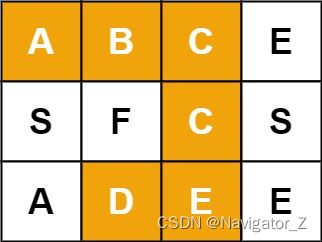LeetCode //C - 79. Word Search
79. Word Search
Given an m x n grid of characters board and a string word, return true if word exists in the grid.
The word can be constructed from letters of sequentially adjacent cells, where adjacent cells are horizontally or vertically neighboring. The same letter cell may not be used more than once.
Example 1:
Input: board = [[“A”,“B”,“C”,“E”],[“S”,“F”,“C”,“S”],[“A”,“D”,“E”,“E”]], word = “ABCCED”
Output: true
Example 2:
Input: board = [[“A”,“B”,“C”,“E”],[“S”,“F”,“C”,“S”],[“A”,“D”,“E”,“E”]], word = “SEE”
Output: true
Example 3:
Input: board = [[“A”,“B”,“C”,“E”],[“S”,“F”,“C”,“S”],[“A”,“D”,“E”,“E”]], word = “ABCB”
Output: false
Constraints:
- m == board.length
- n = board[i].length
- 1 <= m, n <= 6
- 1 <= word.length <= 15
- board and word consists of only lowercase and uppercase English letters.
From: LeetCode
Link: 79. Word Search
Solution:
Ideas:
Main Idea:
The main concept here is to use Depth First Search (DFS) to explore the board. Starting from each cell, the algorithm tries to construct the word by moving either horizontally or vertically through adjacent cells. While doing so, the algorithm makes sure not to use the same cell more than once.
Details:
1. Starting Point:
- The function exist iterates through every cell in the board. For each cell, it checks if the word can be formed starting from that cell by invoking the dfs function.
2. DFS Function (dfs):
- The purpose of this function is to explore all possible paths from a given cell (i, j) to see if the word can be constructed.
- It first checks if the current cell’s value matches the current character of the word (word[index]). If not, it returns false.
- If the cell’s value matches the last character of the word, it means the word is found, and it returns true.
- If the cell’s value matches the current character but is not the last character of the word, it proceeds to search in all four directions: up, down, left, and right.
3. Avoiding Revisiting the Same Cell:
- To ensure the same cell is not used more than once, the function temporarily marks the current cell as visited by setting its value to 0 (or any character that is not a valid board character). This is a kind of “backtracking”.
- After exploring all paths from the current cell, its original value is restored, which undoes the “marking”.
4. Result:
- If at any point during the search, the dfs function finds the word, it returns true to the main exist function.
- If the word is not found starting from any cell in the board, the exist function returns false.
Code:
bool dfs(char** board, int i, int j, char* word, int index, int boardSize, int boardColSize) {
// Base case: if the current position is out of bounds or the current character does not match
if (i < 0 || i >= boardSize || j < 0 || j >= boardColSize || board[i][j] != word[index]) {
return false;
}
// If we've reached the end of the word, then we've found a match
if (index == strlen(word) - 1) {
return true;
}
char tmp = board[i][j];
board[i][j] = 0; // Mark the cell as visited
// Recursively search for the next character in all four directions (up, down, left, right)
bool found = dfs(board, i + 1, j, word, index + 1, boardSize, boardColSize)
|| dfs(board, i - 1, j, word, index + 1, boardSize, boardColSize)
|| dfs(board, i, j + 1, word, index + 1, boardSize, boardColSize)
|| dfs(board, i, j - 1, word, index + 1, boardSize, boardColSize);
board[i][j] = tmp; // Restore the cell value after the DFS
return found;
}
bool exist(char** board, int boardSize, int* boardColSize, char* word) {
for (int i = 0; i < boardSize; i++) {
for (int j = 0; j < boardColSize[0]; j++) {
// Start the DFS search from each cell in the board
if (dfs(board, i, j, word, 0, boardSize, boardColSize[0])) {
return true;
}
}
}
return false;
}


